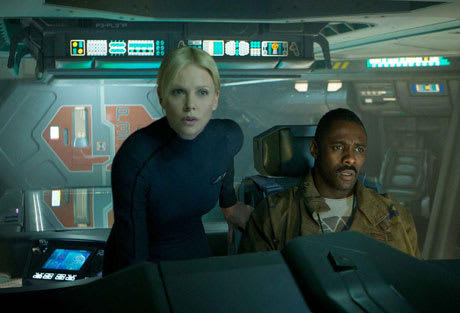While it's possible to get drawn in by the gorgeous design and soft philosophical musings of Ridley Scott's return to science fantasy, it takes a willingness to take the story's interior logic, or lack thereof, at face value. Many of the complaints levied against this allegory-reliant quest to touch the face of God stem from expectations about the style of film and the rationality of human behaviour. If one views the expedition of the Weyland Corporation through a misanthropic lens, and can roll with some unlikely probabilities, the often suspect actions of, yes, even a crew of professionals is more pessimistic than nonsensical. Once removing hopeful presumptions of how carefully vetted employees of a shady trillion-dollar corporation would respond to the complete unknown, it's easier to get wrapped up in observing how these admittedly two-dimensional characters (with the exception of David, Michael Fassbender's brilliantly realized adolescent android) do behave. We can't even assume this is some sort of dream team of psychologically grounded professionals and not some of the few willing to commit to such a lengthy and potentially hazardous mission. It's also not unheard of for figures of great hubris to get caught up in grand visions, to the neglect of minor details. Attributing all of the film's occasionally frustrating logic lapses (why would a brilliant A.I. shine a flashlight on a hologram?) to a greater subtext would be more than a little charitable, but it does speak to the strength of the film's broad symbolism that it can support a wide range of interpretations from those willing to engage. Maybe someone who doesn't run diagonally to get away from a giant falling ship really just wants to die. Alas, delving into supplemental material revels that there isn't all that much philosophical intent beyond what can be reasonably sussed out by sharp viewers not caught up in nit-picking plausibility, despite self-aware marketing material that promises "Questions Will Be Answered." They certainly aren't in Ridley Scott's commentary track, unless your queries involve background details largely irrelevant to the greater story. Nothing more than tonal indecision is revealed by a collection of deleted scenes that include optional commentary from the film's editor. "The Weyland Files" initially tantalize, feigning grand import, but deliver mostly pointless background detail. Amid some grating indulgences, there are a few interesting, though underdeveloped ideas, like social cue analysis software, which work as thematic reinforcement, but won't satisfy those looking for hard factoids. A second commentary track by writers Jon Spaihts and Damon Lindelof is more telling of what got lost in translation. The articulate duo delves into how the screenplay's shape changed as its thematic intent overtook the needs of the film as an integral piece of the Alien universe. From the sounds of things, Spaihts's version was more of a hard sci-fi horror, and the evolution of the story towards Lindelof's nihilistic questioning of the intent of design left some vestigial plot points that Ridley neglected to excise. Having taken his bruises over the ending of Lost, Lindelof is frequently defensive and quick to point out his pretentiousness, but stands by his refusal to tie a neat bow on every idea. If you weren't satisfied by Prometheus the first time around, the Blu-Ray doesn't contain anything likely to satiate.
(Fox)Prometheus [Blu-Ray]
Ridley Scott

BY Scott A. GrayPublished Oct 19, 2012